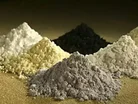McKinsey: Tech & Laws can Ease Critical Minerals Shortage

Ensuring sufficient critical minerals are available to support the deployment of low-emissions technologies will require significant scale-up of their extraction and refining, a new McKinsey report says.
The report – The hard stuff: Navigating the physical realities of the energy transition – stresses how the energy transition is in its early stages, with only an estimated 10% of required deployment of low-emissions technologies by 2050 achieved in most areas.
In the second part of our look at this report, we cover McKinsey's take on how new clean energy regulations and technology can ease strains on supply of the most in-demand critical minerals ...
Tech solutions target critical minerals processing
The consultancy identifies technological solutions to address supply constraints. These include streamlined permitting processes and modular construction methods. Direct lithium extraction technology offers significant processing improvements.
McKinsey says direct lithium extraction achieves 90% recovery rates. Traditional evaporation methods recover 50%. Processing time reduces from 18 months to one week.
AI applications, meanwhile, are enhancing exploration efficiency. McKinsey says new technologies are improving deposit estimates and site selection processes. Copper processing innovations, for example, include bulk-ore sorting and digital process twins.
The report says that new copper and cobalt projects in the Democratic Republic of Congo demonstrate tech-driven faster rates of development. These projects, it points out, utilise historical exploration data from 1960 to 1980, modular construction methods are also speeding up design and construction phases.
Environmental concerns, however, are impacting project development globally. McKinsey says Chile, Serbia and the US face community opposition to new mining projects, with water usage and waste rock management driving these concerns.
Such conerns are not helped by the fact critical minerals projects generate more waste rock than traditional mining. Iron ore typically contains 50 to 70% metal content. Copper ore averages below one% metal content. Clean energy material production could create 13 billion tonnes of waste rock by 2050.
The McKinsey report cites pathways to increase growth of mineral recycling initiatives. These include:
• The European Union Critical Raw Minerals Act, which requires a recycling level of 25% for strategic raw materials by 2030. The short-term impact of this, it says, remains limited due to few end-of-life clean energy assets.
• Material efficiency gains provide alternative solutions. Lithium use in EVs decreased 30% between 2010 and 2022. Solar panel polysilicon and silver content reduced by 60 to 80%.
• Technology substitution offers additional options. Hydrogen electrolyzer designs demonstrate potential material reductions. Alkaline water electrolysis could replace iridium-intensive proton exchange membrane systems.
Mining companies face clean energy trade-offs
The report also discusses the performance implications of 'material substitution'. Alkaline electrolysis, it says, produces lower-purity hydrogen than proton exchange membrane systems. This, it says, impacts fuel cell vehicle applications.
Automotive manufacturers, meanwhile, are planning rare earth-free electric motors, which have reduced torque and power output. Aluminium can replace copper wiring but shows greater heat expansion characteristics.
Application-specific solutions are beginning to emerge from these constraints, the authors say. They point out that lithium iron phosphate batteries – also known as lithium ferrophosphate batteries – now power 40% of new electric vehicles. These batteries use less cobalt and nickel than conventional designs.
The report's authors also observe that sodium-ion battery developments are targeting grid storage applications. This technology reduces lithium dependence. Multiple manufacturers announced sodium-ion projects in 2023 and 2024, they say.
Critical minerals supply concentration a global challenge
McKinsey points out how China dominates global minerals processing; the country refines over 60% of cobalt, lithium, natural graphite, and rare earth elements, and adds that skills shortages are hamperingf processing capacity development in other regions.
International cooperation addresses these constraints, it says. It cites the case of Malaysia, which renewed its partnership with Australian mining company Lynas in 2023. This created, it says, the largest rare earth elements refinery outside China.
It also points to the Minerals Security Partnership, which launched in 2023 and applies to a total of 14 countries and the European Union. The initiative is designed to diversify mineral supply chains, including extraction and processing operations.
McKinsey says: "Supply chain constraints require both technological innovation and international cooperation. Current project development timelines challenge energy transition targets. Industry must balance environmental impacts with critical minerals demand growth."

